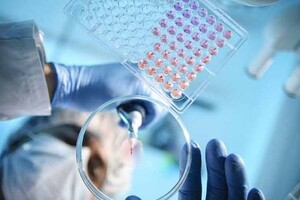
Medicine has never been more exciting and dramatic, with doctors and scientists on the brink of a new dawn in which the genetic secrets of life and death will be revealed

Genetic revolution: as scientists continue to fix genetic faults by altering DNA, they will face questions about whether it is ethical to tinker with human life
Few professions give graduates the chance to change the world for so many in such a fundamental way. And crucially, Britain is leading the field in science and medicine.
This year, the UK became the first country to allow a groundbreaking IVF technique that uses the DNA of a ‘third parent’ to fix faults in an egg, preventing diseases such as muscular dystrophy. It was developed at Newcastle University and the first babies could be born next year, offering hopes to thousands of women worried about passing on faulty DNA to their children.
Britain has also begun a landmark project to sequence 100,000 genomes in the hope of discovering which genes are responsible for rare cancers and other diseases. It is the largest scheme of its kind in the world and will shed light on illnesses that have baffled doctors for generations.
Elsewhere, recent breakthroughs in stem cells – the building blocks of all cells – mean that in our lifetime we can expect to be able to grow back organs, bones and cartilage in the lab. Scientists are already working on digital medical records, which would scan the whole body to keep a three-dimensional image that could be referred to in the event of an accident. Surgeons could 3D-print an exact copy of a limb using titanium powder.
Digital medicine is likely to revolutionise healthcare. In the future a doctor’s appointment will probably take place online. Smartphones can already monitor vital signs such as heart rate, but this is likely to extend to blood tests, insulin levels and cholesterol.
We can expect to see cures for cancer and diabetes. Scientists are close to working out how to turn off these devastating diseases at a molecular level. And we are getting far better at discovering what lifestyles are likely to help us live longer. Soon we will know exactly how much to exercise and eat for the longest life.
However, the race towards a healthier population comes with a cost. One of the greatest challenges the medical world faces is the rise of antibiotic resistance. Dame Sally Davies, the Chief Medical Officer for England, has claimed it is a bigger threat than terrorism.
Around 5,000 people a year die in Britain each year because they pick up infections that antibiotics can no longer cure. That is more than die on the UK’s roads annually. Scientists are not discovering new types of antibiotics fast enough to keep up with the levels of resistance. And if nothing changes, the world could return to a point where the slightest infection kills and the simplest operations are deadly.
An ageing population will also bring challenges. More than one in three babies born today will live to 100. Dementia rates are soaring and despite intensive research, nobody is close to discovering a cure for devastating diseases like Alzheimer’s.
And the future of medicine is likely to present an increasing number of moral dilemmas. As scientists continue to learn how to fix genetic faults by altering DNA, they will have to face important philosophical questions about what makes people human and whether it is ethical to tinker with that.
Despite the challenges, there are few professions that are as important or can do so much good. If you want to change the world forever, this is the career for you.
http://www.telegraph.co.uk/sponsored/education/the-axis/11449131/future-of-medicine-industry.html
